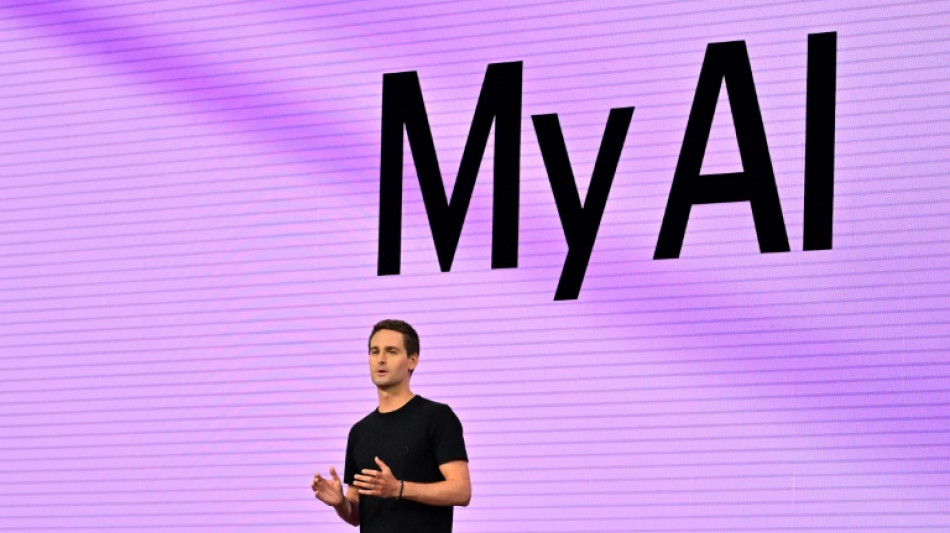

Snapchat seeks path to profit without losing its way
Snapchat parent Snap on Wednesday unveiled new tactics including the increased use of artificial intelligence in its struggle to expand beyond the app's loyal user base and reach profitability.
Snap chief Evan Spiegel, who cofounded the Southern California-based company in 2011, opened its annual conference with word that an average of 750 million people use the image-centric messaging service each month.
In more than 20 countries, Snapchat reaches the vast majority of those who range in age from 13 to 34, Spiegel said.
But unlike Meta, with its "family" of apps including Facebook, Instagram and WhatsApp, Snap has never made enough money from advertising to turn an annual profit.
Last year, Snap's net loss tripled to $1.43 billion and it laid off a fifth of its workforce.
Tools and products presented on Wednesday were intended to attract audience-winning creators to the platform, get users paying for subscriptions, and convince partners such as advertisers that the app is a place to be.
However, Snapchat must be "careful not to stray too far from its roots" as an ephemeral, fun messaging service as it seeks ways to make money, warned Insider Intelligence analyst Jasmine Enberg.
Snapchat needs to find a balance between private exchanges, "public spaces," and the sense of "community and intimacy" that it has cultivated since its inception, the analyst added.
- AI Snaps -
A decade ago, Snapchat came on the scene with an intentionally ephemeral product -- images that disappear after a short period, an idea that was copied by other platforms. Users invented "stories," a way for them to put "Snaps" taken through any given day together into a visual tale.
The service was a pioneer in using images instead of words to communicate, and playfully augmenting what cameras see using artificial intelligence "lenses."
But, "no one is talking about" Snapchat because "they are not relevant," Creative Strategies analyst Carolina Milanesi told AFP.
Snapchat does not even seem to attract the interest of regulators, who have made targets of TikTok and Meta, the analyst noted.
Spiegel embraced the difference, casting Snapchat as a break from the "social media popularity contest."
"We're fed up with having to look pretty or perfect in every post," Spiegel said.
"Tired of competing for likes and comments; exhausted by misinformation."
Snapchat, instead, is a place to enjoy authentically communicating with friends and family, he maintained.
The app opens by default in a smartphone camera, letting users take photos or videos with or without filters to augment reality.
Such "Snaps" can be shared publicly at Snapchat or privately with those in one's selected circle.
Tools presented on Wednesday included being able to ask questions of a "My AI" chatbot in group exchanges.
Subscribers to the Snapchat+ subscription service launched last year will soon be able to send Snaps to My AI and get a "unique generative Snap back that keeps the visual conversation going," the company said.
- 'Not essential' -
Like rivals, Snapchat is out to woo "influencers" whose posts attract viewers and advertisers.
Snap vice president Jack Brody reasoned that creators find Snapchat to be a place where they can "express their authentic selves."
Alyssa McKay, a 23-year-old creator, told AFP of going from doing scripted skits on TikTok that weren't really her to winning fans by being herself on Snapchat.
"I am one of the top female creators on Snapchat," said McKay, who has some two million subscribers at the service and gets a share of ad revenue.
"I have such a strong relationship with my audience because they feel like they know me, and you don't get that on other platforms."
But, Snapchat is not considered essential by most social media influencers, said Alessandra Angelini, founder of Influur, a service that connects brands with content creators.
They tend to put their energy into making money at Instagram and TikTok, not considering Snapchat as promising, Angelini said of influencers.
Snapchat on Wednesday set out to win them over with more ways to be noticed and share in ad revenue.
Snap also gave more details about ARES, its new business unit that will provide a suite of augmented reality tools for online retailers.
C.Queeney--NG



